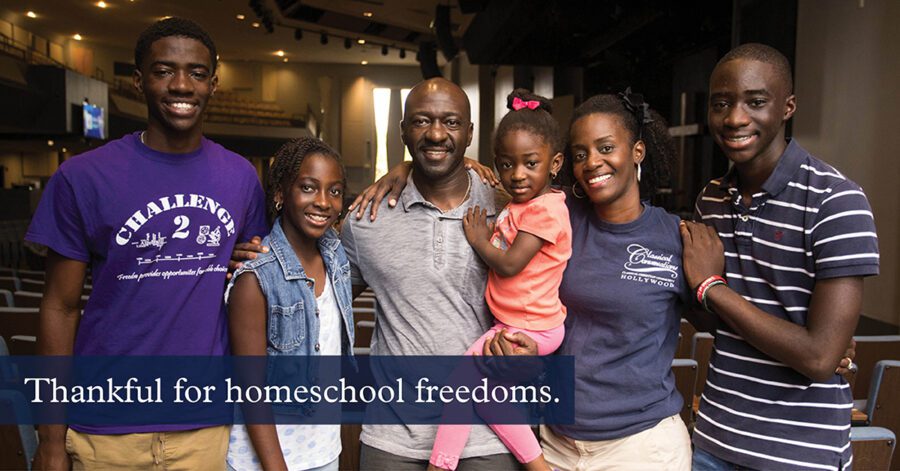By Edward Murray
“Offer to God a sacrifice of thanksgiving . . . ” —Psalm 50:4 (ESV)
Fall is my favorite time of year, and for several reasons—one of which is because it marks the beginning of the holidays. However, one holiday stands out as my favorite: Thanksgiving. While this holiday may not recognize a biblically historical event, its intended is to direct us towards a biblical virtue of contentment: being thankful for what God has already given us. This month, let’s ask ourselves: Are we thankful for our freedom to homeschool? Put another way: Although homeschooling is our God-given right, are we thankful that our country currently recognizes our freedom to homeschool?
News outlets recently reported that states across the nation have seen exponential growth in homeschooling since the pandemic. In fact, “Homeschooling has become America’s fastest-growing form of education and continues to explode in popularity long after pandemic-era remote learning has ended . . . ”1
Are We Thankful for Homeschooling?
Mairead Elordi further reports, “Before the pandemic, there were 1.5 million homeschoolers in the U.S., according to the National Center for Education Statistics. Now, there are between 1.9 million and 2.7 million homeschoolers in the country, the Post’s analysis estimated. Only two states, Georgia and Maryland, have seen homeschooling return to pre-pandemic levels.”2
Although conservatives lost both houses in my state of Virginia recently, Danny Diggs (R) beat out Monty Mason (D) for the Twenty-Fourth Senate District, and for good reason. Recently, Mason was captured on hot mic mocking parental rights as “garbage, crap, and stupid.”3 Meanwhile, whatever is thought of his official performance, Virginia Governor Glenn Youngkin made visible the parental-rights undercurrent when he ran on these issues and won.
What do we learn from all this? Although previous homeschoolers understood the threats in the 80s and 90s, now younger generations are awakening to these realities. The state is not to be ignored, and infringement is a constant danger. In other words, awareness is leading us to thankfulness and action.
It’s Easy to Forget
As a former pastor, I’ve made this principle a repetitive talking point. Thankfulness is not a passive state of being but an active discipline. Not to be too philosophical, but although we may reach a state of being thankful, biblically speaking, thankfulness is something we actively exercise, whether we are or not.
Many psychologists suggest beginning or ending each day with a list of at least 3–5 things we are thankful for. Why do we need this? Because we are naturally bent towards negativity and forgetfulness due to sin.4 This is why the Lord instructed His people to erect monuments and practice regular rhythms of festival and feasting in the Old Covenant. He knows our frame (Ps. 103:14) and knows our proclivity to failure when it comes to reminding younger generations (Josh 4:19–24). Throw all this in with these day-to-day realities:
- Homeschooling is hard.
- Making disciples is hard.
- Soul-winning is hard.
- Gathering ourselves for reflection when our energy is spent at the end of the day is hard.
Are we thankful for our freedom to homeschool? In many ways yes, we are! However, in many ways, we tend to drop the ball when it comes to being actively thankful. We’re distracted. If it takes sitting down and writing a daily list of three reasons to be thankful for our freedom, let’s do it.
Don’t Take Freedom for Granted
As I mentioned earlier, we currently have the freedom to personally educate our children. But let’s not take this for granted. Don’t fail to properly appreciate what we possess at this moment in history. Although homeschooling is our God-given right, the government’s willingness to recognize this is not to be assumed in a fallen world.
Although homeschooling is biblically normative (and was historically normative prior to the twentieth century), the legal prohibition against this is relatively recent. This current freedom is very fresh. Remember, it has only been since 1992 that all fifty states officially recognized homeschooling as a legal option.5
Moreover, you’ll recall that the Romeike family fled Germany in 2008 for asylum in the United States, solely for the opportunity to homeschool. They’re now under the threat of deportation by the U.S. government, with a temporary delay granted just October 6 of this year. Their stay is not guaranteed, and they still need our support.
Find out how you can help the Romeike family with our friends at HSLDA.
Although our current moment is witnessing a rapid increase and appreciation for homeschooling, critics and legislators continue to push for more government oversight. This shouldn’t be underestimated. Every year across the country, legislation swarms the halls of our capitols, sparkling with subsidies and laced with infringements. Don’t take your freedom to homeschool for granted. It is on the docket and at the ballot box every election.
How Then Should We Live?
This month, reflect on this question: Am I thankful for my freedom to homeschool? Current trends indicate that more are awakening to this blessing and that it’s something to fight for. Yet given our proclivity to forgetfulness, we need to endure with active thankfulness. Don’t take for granted the hard-won battles of generations past. Future generations are depending on us.
Legend has it that Ben Franklin was asked what type of government was created from the Constitutional Convention. His pithy response was, “A republic if you can keep it.” This mantra should ring in our heads as we reflect on our liberty to homeschool.
The principle is clear: If we want to keep our liberty, we must fight for it. It’s only ours “if we can keep it.” We cannot remain idle.
This Thanksgiving, let’s pause to be thankful for our freedom to homeschool. Additionally, let’s pray, celebrate, and feast in the presence of the Lord for this blessing. And when our meal is over, let’s be actively thankful by engaging our spheres of influence with awareness of what’s at stake.
Happy Thanksgiving!
“Rejoice always, pray without ceasing, give thanks in all circumstances; for this is the will of God in Christ Jesus for you.” —1 Thessalonians 5:16–18 (ESV)

Edward Murray currently serves as Manager of Special Projects and Research for the Strategy and Corporate Affairs Team at Classical Conversations. He is a native of Augusta, Georgia, and an alumnus of Reformed Theological Seminary in Charlotte, North Carolina, where he earned his Master of Divinity. He currently lives in Newport News, Virginia, with his wife and three children.
- Peter Jamison, Laura Meckler, Prayag Gordy, Clara Ence Morse, and Chris Alcantara, “Home Schooling’s Rise from Fringe to Fastest-Growing Form of Education,” Washington Post, October 31, 2023, https://www.washingtonpost.com/education/interactive/2023/homeschooling-growth-data-by-district/. ↩︎
- Mairead Elordi, “Homeschooling Continues to Rise Dramatically, WaPo Analysis Shows,” Daily Wire, November 1, 2023, https://www.dailywire.com/news/homeschooling-continues-to-rise-dramatically-wapo-analysis-shows. ↩︎
- Brandon Gillespie, “Democratic Lawmakers Caught on Hot Mic Mocking Parental Rights as ‘Garbage,’ ‘Stupid,’” Fox News, April 26, 2023, https://www.foxnews.com/politics/democratic-lawmakers-hot-mic-mocking-parental-rights-garbage-stupid. ↩︎
- Psychologists recognize a phenomenon labeled “negativity bias.” This refers to our brain’s response to negative stimuli with greater neural processing over positive stimuli. Because of this, we tend to find bad news more fixating than good, as well as see more lasting impact from negative experiences (e.g., insult, trauma, etc.) than positive experiences. For further reading, Kendra Cherry, “What Is the Negativity Bias,” Verywell Mind, November 13, 2023,. https://www.verywellmind.com/negative-bias-4589618. ↩︎
- “The History of Homeschooling in the United States,” Northgate Academy, January 12, 2022, https://www.northgateacademy.com/the-history-of-homeschooling-in-the-united-states/#:~:text=In%201992%2C%20homeschooling%20was%20officially,to%20750%2C000%20students%20in%201995. ↩︎
